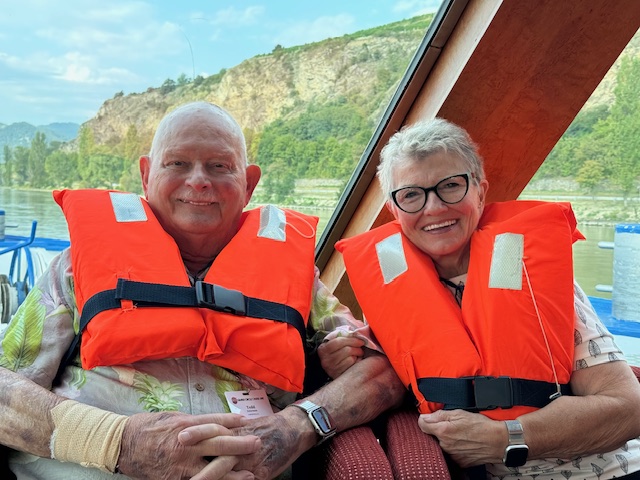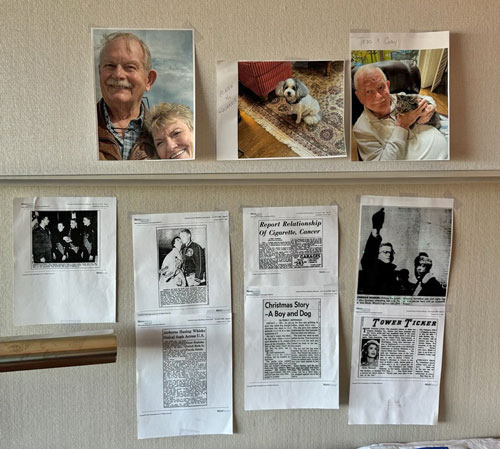Jean Determan, 77, was exhausted. It was September 20, 2024. Her husband, Tedd, 87, was nearing what would become the final month of his life.
Seven months earlier, after seeking medical help for a nagging dry cough, Tedd received a brutal diagnosis: small cell lung cancer, the most aggressive form of the disease with the lowest survival rates.
But Tedd, a father and grandfather was determined to outrace the cancer. He lived his life on adventure and wasn’t going to let an acute diagnosis slow him down. The Naperville, IL couple filled the days and weeks between chemo treatments with dinners at Don Julios, their favorite eatery, five plays in five weeks, and treks to Wisconsin.
“He was determined to keep living life to the fullest,” says Jean.
 In August, when Tedd completed chemo, radiation and a surgery, he and Jean, buoyed by hope, set off on a Danube river cruise sailing from Vienna to Prague.
In August, when Tedd completed chemo, radiation and a surgery, he and Jean, buoyed by hope, set off on a Danube river cruise sailing from Vienna to Prague.
But in early October, after what had become routine scans, shadows on his brain sent him immediately to the ER. After months of trying to navigate the complex, often dehumanizing world of cancer care, they were informed the lesion had multiplied to 50 and Tedd landed in a sterile, fluorescent-lit hospital room in DuPage county. Discussions about adventures were replaced by somber whispers about hospice. “It felt as though the world around us had grown colder, quieter,” says Jean.
She sat beside Tedd, holding his hand, but there was a nagging sense that something was missing. His care felt distant, mechanical. The nurses and doctors came and went, but none truly seemed to see him—not the man he had been, not the life he had lived, not the love and laughter that had once surrounded him. “I just prayed every day that he would not suffer,” she says. “He had fought so hard, and now it was about comfort, about hoping he would not be in pain.”
It was during this challenging time that Jean's journey took an unexpected turn. Via Zoom, she attended Advocate Healthcare’s 10th Annual Narrative Medicine Conference, The Healing Power of Storytelling, in Park Ridge, at the urging of her cousin, Dr. Marjorie Getz, co-founder of Advocate’s Narrative Medicine program.
At the conference, Jean attended a compelling presentation, “It’s Your Patient Story and It’s Compelling.” One of the presenters who described her experience caring for her aunt during her final years of life.
"When my 95-year-old Aunt Dorothy was in the ER, after a fall -- and many times during her final years -- the medical staff treated her as just another agitated, elderly patient," the presenter shared. "They saw a frail, confused woman, not the vibrant artist and poet she had been."
But when her niece shared Dorothy's story—how she had graduated from the Art Institute of Chicago, taught herself French on her iPad, and spent her final years offering emotional support to her peers—the healthcare team’s approach shifted dramatically. Dorothy was no longer just a medical case; she was a human being with a rich, meaningful life, who deserved compassionate care.
The Power of a Blue Folder
That moment sparked an idea for Jean. She was inspired by the profound potential of storytelling to demonstrate to his care team Tedd, as a human being and not just an insurance code number or diagnosis. She returned home and began creating a "Blue Folder" filled with photos, memories, and newspaper clippings that told the story of Tedd’s bright and brilliant life.
She tacked the photos and articles to the walls—one by one, each image a thread in the rich tapestry of Tedd's life. She wanted the doctors and nurses to see him, not just as a patient in a bed, but as the man who had lived fully, laughed deeply, and loved without reservation.
As she worked, Jean felt a sense of calm wash over her. She wasn’t just documenting Tedd’s past; she was claiming it, showing the world who he really was. And when the medical team entered the room later, they paused; eyes lingered on the walls, scanning the photographs, taking in the stories displayed before them.
— Jean Determan
“The shift was immediate,” says Jean. “There was a change in the way everyone from the doctors to the chaplain to the palliative care person and the woman who cleaned the room spoke to Tedd, a gentler tone, a newfound respect in their eyes. They weren’t just treating a patient anymore. They were caring for a man with a history, a family, a legacy.
“He became Tedd,” she says. “At one point I looked over and saw Ted smiling, he loved that we were talking about him.”
But it wasn’t just the medical team who felt the difference. Jean, too, felt seen.
“It changed how they treated me,” says Jean. “One doctor called me three times to explain the DNR and what that meant. I never had a doctor call me through this whole time.”
As she sat at Tedd’s bedside, Jean realized that this—a respectful recognition of his life, his past, and his essence—was the most powerful form of care they could both receive. It wasn’t just about treating his illness; it was about honoring the man he had been, the life he had lived, and the love they shared.
The Blue folder contents told a story of a man whose life was truly “larger than life.” Known for his adventurous spirit and entrepreneurial drive, he captivated everyone with his charm, humor, and legendary storytelling.
Living Fully, Loving Deeply: Tedd’s Legacy
 Tedd grew up in Riverside, CA, excelling as an Eagle Scout, athlete, and debater. At Claremont Men’s College, his spirited nature earned him leadership roles. Elected as president of his class, found himself the target of a playful college rivalry when the freshman class “kidnapped” him and sent him on a one-way flight to New York. This unexpected journey led to an encounter with Natalie Wood, fresh from her triumph in West Side Story. The moment made international news, capturing Tedd in the limelight and earning him an invitation to appear on The Today Show and later as a contestant on You Bet Your Life with Groucho Marx.
Tedd grew up in Riverside, CA, excelling as an Eagle Scout, athlete, and debater. At Claremont Men’s College, his spirited nature earned him leadership roles. Elected as president of his class, found himself the target of a playful college rivalry when the freshman class “kidnapped” him and sent him on a one-way flight to New York. This unexpected journey led to an encounter with Natalie Wood, fresh from her triumph in West Side Story. The moment made international news, capturing Tedd in the limelight and earning him an invitation to appear on The Today Show and later as a contestant on You Bet Your Life with Groucho Marx.
Ted’s professional life was remarkable; was a dedicated newsman who made his own mark in civil rights and cultural contributions. From launching a newspaper in post-revolutionary Cuba to reporting for UPI and working as a civil rights publicist, Tedd used his talents to make an impact. His work with Dick Gregory and investigative reporting for U.S. Attorney General Robert Kennedy contributed to significant civil rights victories, including the release of an innocent man from prison. In Chicago, Tedd managed theaters and launched trailblazing ventures, including a TV production company showcasing underrepresented stories. Hiring Chuck Stone as the first Black commentator on American TV was one of his many groundbreaking achievements.
“Tedd’s care didn’t just change that day—it was transformed,” Jean says. She remembers their last words to each other: “I love you Tedd.” “I love you too, Jeannie.”
On Nov.1, 2024, Jean posted on her LinkedIn page:
“It is with great sadness that I am letting his friends and associates know that my wonderful husband, Tedd Determan, former CEO and Founder of Force Diagnostics passed away on Nov. 1, 2024. Tedd was an adventurer, an entrepreneur, a captivating storyteller, and a man with boundless curiosity. He was also the most generous and loving husband. He fought a courageous battle against cancer.”

